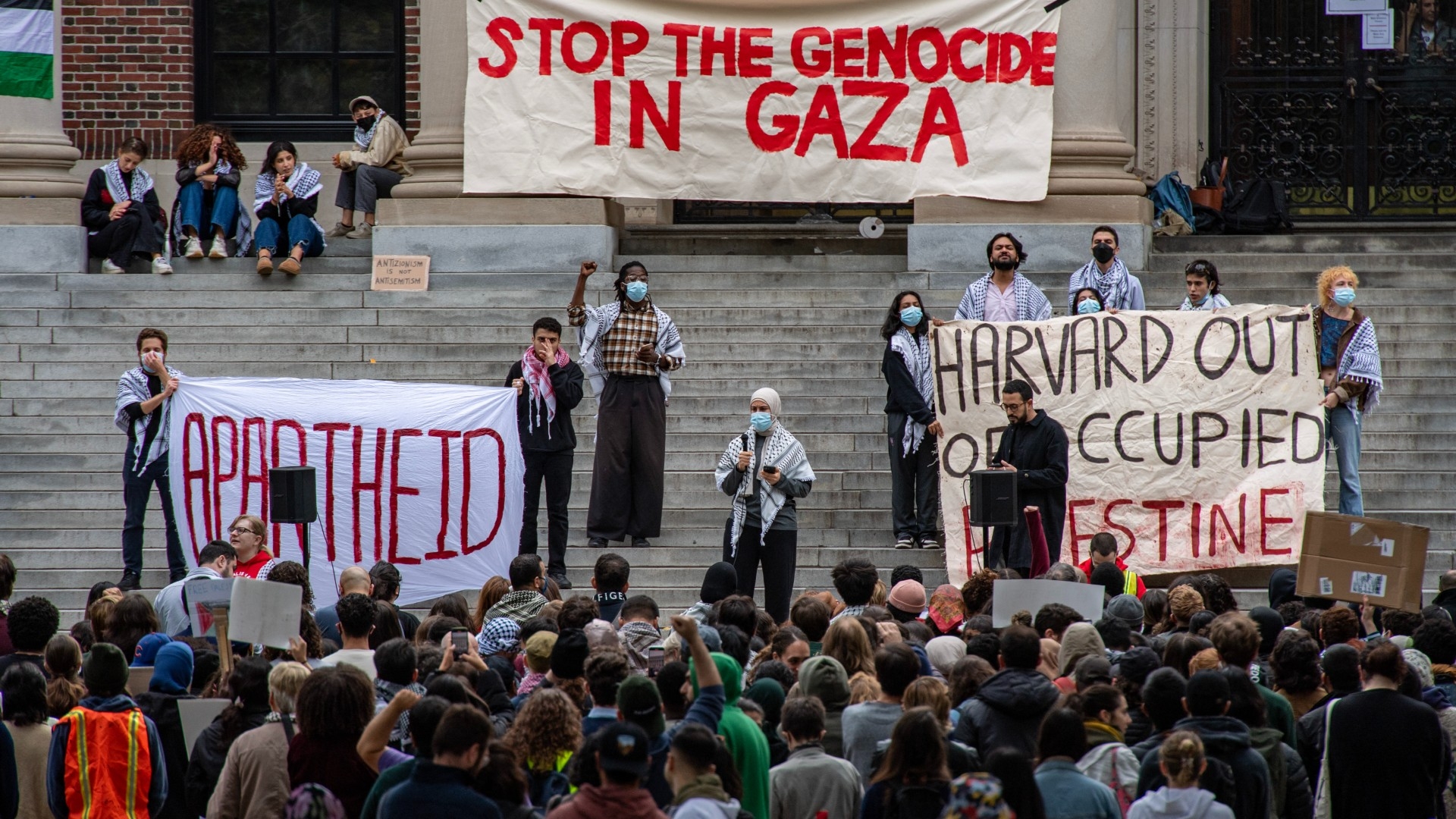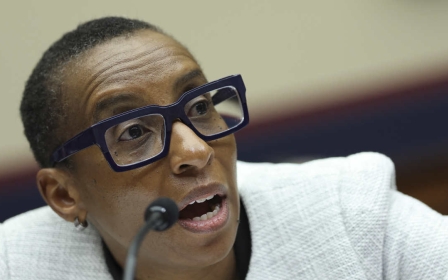Harvard professor's wife harassed another pro-Palestine student days before viral video

A Palestinian-American student at Harvard University was hounded and intimidated by the wife of a Harvard professor and former aide to Barack Obama just days before she was caught on camera harassing another student for wearing a Palestinian scarf known as the kefiyyeh, Middle East Eye can reveal.
John Abughattas, a Palestinian PhD candidate at Harvard, told MEE that Eve Gerber, the wife of Harvard professor Jason Furman, also followed him around a section of the campus, taunted him for wearing a kefiyyeh and reportedly called him "a terrorist and an antisemite".
"She specifically called me a supporter of Hamas and asked if I support the destruction of mosques, implying that all Palestinians are to blame for Israel's killing of Palestinian civilians and destruction of Gaza," Abughattas, who was taking a walk with a friend at the time on 10 October, said.
"I was made to feel like a threat who did not belong on Harvard's campus," he said.
Abughattas explained he did not report the incident to the university at the time because he had no idea who the woman was and didn't have any faith that the institution would take it seriously.
This changed on 13 December, when a video from two months prior went viral and identified Eve Gerber as the person hounding another Harvard student for wearing a kefiyyeh.
In the video, Gerber is seen chasing after the student and levelling several charges at her.
'Harvard has been an exceedingly hostile space to Palestinians, so much so that I have considered leaving'
- John Abughattas, PhD student
As the video made its rounds on social media and the story was picked up by national outlets, Abughattas said he saw the video and identified Gerber as the same person who had chased him days earlier for wearing a keffiyeh.
He immediately wrote to Harvard to report what had happened to him.
"Now that I know the identity of my harasser, I am reporting this incident directly to the university as well as HUPD [Harvard University Police Department]. Harvard has been an exceedingly hostile space to Palestinians these past two months, so much so that I have seriously considered leaving," Abughattas wrote in his statement sent to Harvard's Chief Diversity and Inclusion Officer in the Office of the President.
Neither Gerber nor her spouse Jason Furman, an economics professor at the Harvard Kennedy School, responded to MEE's requests for comment.
Institutional power
Harvard University, like several other educational institutions in the US, has been beset with problems since the events of 7 October, with pro-Israel groups and billionaire donors raising the issue of antisemitism in response to growing pro-Palestine protests and support for the people in Gaza amid the mounting death toll there.
According to the latest statistics from the Palestinian Ministry of Health, women and children have accounted for nearly 70 percent of the 20,000 killed in Gaza. Around 1,200 Israeli nationals and residents were also killed during the events of 7 October.
In the incident that was captured on video in mid-October, Gerber could be seen and heard describing the kefiyyeh as "a terrorist scarf".
"Hi, camera! Thank you for walking through neighbourhoods and making families feel unsafe with your terrorist scarf," Gerber said to the student filming her.
"I'm glad you're so proud of the slaughtering of civilians," Gerber added.
'Gerber's actions are inextricable from the global dehumanisation of Palestinians and the ongoing US support for the genocide of Gaza'
- Harvard Palestine Solidarity Campaign
Following public outrage over her harassment of the second student, Gerber released a statement on 13 December in which she said she deeply regretted her actions. Six days after the incident, Furman exchanged a text message with a friend of the student in which he apologised for his wife's actions.
However, the student, who asked to remain unidentified over fears of reprisals, told MEE that she rejected both Gerber's apology and Furman's outreach.
In her first comments since Gerber's statement, the student told MEE that she found it baffling that Furman would need to apologise for his wife's actions. "He was not the one who harassed me. We all know that women have autonomy and she is responsible for her own actions," the student said.
The student noted that Gerber had not reached out to her personally to deliver her "apology". Crucially, the student added, Gerber had misrepresented the incident as a discussion on the street that had turned into an ugly "political argument", when there had been nothing consensual about the interaction.
"Eve Gerber saw me walking by in a keffiyeh, parked her car, got out, and began to follow me while verbally harassing me," the student said.
"She was unmistakably hostile from the get-go. I kept walking, and my responses were limited to countering, calmly, the atrocious claims she was throwing at me," the student said.
A spokesperson with Harvard's Palestine Solidarity Committee (PSC) told MEE that it was "deeply disturbing that Harvard students are expected to participate normally in university life while individuals with meaningful institutional power repeatedly harass and intimidate them".

Prior to his time with Obama, Furman worked as an economic policy director for John Kerry's 2004 presidential campaign.
Gerber has also enjoyed stints in various capacities with the Democratic Party, including as a speech writer for US army general Wesley Clark's presidential campaign in 2003, and is listed as the US editor of Five Books.
In the lead up to the 2020 election, Gerber lavished praise for Biden in an article for The Atlantic Magazine. "I believe that Biden, far from a bad man, is an unusually good one," she wrote.
Harvard's PSC spokesperson noted that the issue was larger than Gerber and pointed to "a deeper culture of anti-Palestinian racism at Harvard... one where Black, brown, Muslim and pro-Palestine students more broadly are targeted for their appearance and beliefs".
"Harvard has fostered a hypocritical culture of impunity that allows such harm to go unchecked, one where slogans merit emails from the president but doxxing trucks and open harassment don't.
"Our leaders have not only failed to respond to these racist double standards - they are active agents of it. Gerber's actions are inextricable from the global dehumanisation of Palestinians and the ongoing US support for the genocide of Gaza, one rooted in the tacit belief that Palestinians' safety and well-being are secondary at best," the spokesperson added.
Restorative Action
Both the student who filmed Gerber harassing her as well as Abughattas said that there was a way for Gerber to atone for her behaviour.
Not only should should Gerber personally apologise and accurately acknowledge her actions, the students said, but she should also offer a donation to Hisham Awartani, the 20-year-old Palestinian student from Brown University who was shot and paralysed from the neck down for wearing a kefiyyeh.
Awartani was one of three Palestinian students shot on 25 November in Vermont in what is being described as a hate crime.
"Given the real-life implications of biases that lead to harassment, such as the ones perpetrated by Eve, as well as assault and loss of life, reparations must include material effort, such as in the form of a donation made towards the medical expenses of Hisham Awartani," the student said.
Harvard's PSC echoed the demands of the affected students.
"Gerber must take full accountability for the racist violence she perpetrated by donating to Hisham's recovery fund," a spokesperson said, adding that the PSC has also called on Harvard to establish a committee to investigate anti-Palestinian racism and the suppression of pro-Palestine voices on campus.
Harvard University's media office did not reply to MEE's request for comment.
Middle East Eye propose une couverture et une analyse indépendantes et incomparables du Moyen-Orient, de l’Afrique du Nord et d’autres régions du monde. Pour en savoir plus sur la reprise de ce contenu et les frais qui s’appliquent, veuillez remplir ce formulaire [en anglais]. Pour en savoir plus sur MEE, cliquez ici [en anglais].




